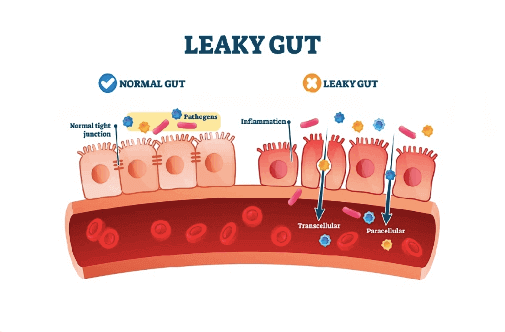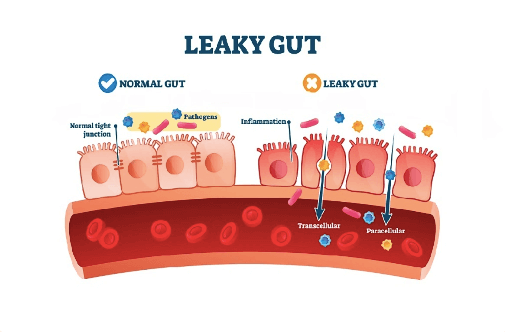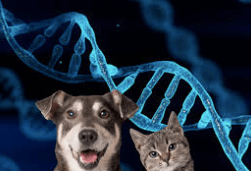Leaky gut is common. About 2,500 years ago, Ancient Greek physician, Hippocrates said, "all disease begins in the gut," leaky gut included. His statement was true then and true now too. In order for the gut, or microbiome to function properly, it needs the appropriate nourishment to maintain a healthy balance of trillions of bacteria, fungi, parasites and viruses that are able to coexist symbiotically. This balance is crucial for overall health because optimal health or disease begins in the gut.
According to the Harvard School of Public Health, in humans, if the gut microbiome becomes unbalance, because of "infectious illness, certain diets, or the prolonged use of antibiotics or other bacteria-destroying medications - dysbiosis occurs, stopping these normal interactions. As a result, the body may become more susceptible to disease. The same is true for our dogs.
In a healthy dog, the intestinal walls serve as a barrier that keeps bacteria, allergens and toxins out of the body's circulation and tissues. When food is eaten, it is passed through the esophagus, stomach, and intestines while undergoing stages of digestion along the way, but only certain substances are absorbed by the intestines and permitted to enter the bloodstream.
However, in a dog with leaky gut, the protective lining function of the intestines is compromised and substances that should normally pass only through the intestines can instead cross the intestinal wall and enter the bloodstream. Undigested food, toxins, bacteria, allergens and yeast leak out of the gut and into the body, which causes an immune response that can lead to chronic inflammation in the entire body. Chronic inflammation is linked to all of the most chronic diseases such as dementia, autoimmune disease, heart disease, diabetes, arthritis, liver disease, cancer, inflammatory bowel diseases and allergies (Dogs Naturally). Leaky gut is common.

Although it is difficult to identify an exact percentage, research suggests that an estimated 10-15% of dogs may experience symptoms related to leaky gut, which is often undiagnosed or misdiagnosed as another condition.
Leaky gut is common and symptoms include:
- Allergies and skin issues
- Autoimmune disease
- Arthritis and joint pain
- Bad breath
- Behavior Issues (aggression or anxiety)
- Digestive issues and bowel disease
- Food intolerance
- Gastrointestinal issues (diarrhea, constipation)
- Inflammatory Bowel Disease
- Liver, kidney, pancreas and gall bladder disorders
- Thyroid issues (and in turn, thyroid issues can worsen leaky gut)
- Yeast Infections
(Source:Dogs Naturally)
Interestingly, dermatitis, which refers to generalized inflammation of the skin is a common symptom many dogs experience. In humans, there is a significant association between atopic dermatitis and leaky gut in humans. This 2024 study explores the relationship between canine atopic dermatitis and intestinal damage by examining biomarkers of the intestine including IAP, TFF‐3, IgE, IL‐4 and IL‐13. Leaky gut is common.
According to the sane study, "of the 26 dogs tested for allergens, 16 were found to be sensitive to mould mites, 10 to vernal grass, eight to house dust mites, five to wheat dust and five to grass pollen mix allergens. Significant increases in serum IAP, TFF‐3, IgE, IL‐4 and IL‐13 concentrations were determined". The study indicates hat the increase in TFF‐3 and IAP concentrations may be caused by the presence of intestinal epithelial damage and the repair of this damage. Additionally the study results suggests that the development of atopic dermatitis could due to the entry of allergens into the body via sites of intestinal damage.
So if your dog has dermatitis or any of the symptoms listed above, it is likely they are experiencing leaky gut.
Common causes of leaky gut include many routinely prescribed medications. These medications include antibiotics, which wipe out both good and bad bacteria in the gut, drugs such as NSAIDs, steroids, antihistamines, heartworm, flea and tick meds, vaccines, stress, candida or yeast overgrowth, and just the aging process itself. When the gut is bombarded with too many foreign substances, leaky gut occurs.
In addition to commonly prescribed medications, another common cause of leaky gut is kibble. It contains large amounts of highly processed carbohydrates, additives, preservatives, food dyes, glyphosate, and mycotoxins that negatively impact the protective lining of the gut. Additionally, the high temperatures used to process kibble can destroy the nutrient profile of the food itself and creates the formation of Advanced Glycation End (AGEs) products.
Although there isn't a test for leaky gut specifically, you could choose to do a hypersensitivity test on your dog to see if the results indicate sensitivity to most proteins. If the results indicate your dog is sensitive to most proteins, it is very likely they do have leaky gut. Leaky gut is common.
If your dog does display symptoms of leaky gut, feeding a diet rich in fiber, lean proteins, healthy fats and probiotics and or kefir` is the best way to support their gut microbiomes. Fiber support digestion, lean proteins provide necessary amino acids and nutrients without adding extra fat, Omega-3 fatty acids help reduce inflammation in the body and probiotics can help maintain the optimal balance between beneficial and harmful bacteria in the gut, which reduces inflammation.
If you need some recommendations on what to feed your dog, raw or home-cooked is the way to go.
Donate to Bobzilla.org

$5.00
The veterinary business is business which is not in the business of curing your animal, but Bobzilla's business is. Bobzilla is committed to one hundred percent transparency in all of its scientific research into animal wellness and prevention of disease and one… read more




